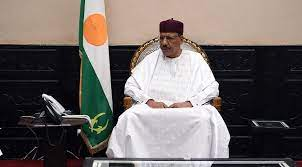Yobe SEMA Activates Flood-Prevention Plan To Save 468,000 Residents
By Muhammad Maitela, Damaturu

Yobe State Emergency Management Agency (SEMA) says it has been implementing a comprehensive plan to protect households prone to flooding in six local government areas and other parts of the state.
Dr. Mohammad Goje, Executive Secretary of the Agency, said at a press conference on Monday in Damaturu that the state’s 2025 Flood Preparedness Plan will save an estimated 467,976 individuals across 126,000 households from flooding.
He said the strategy is built on early warnings, community engagement, and pre-positioned resources to mitigate the flood, which remains a major threat to lives and livelihoods in some areas across the state.
The unveiling of the plan was made in the wake of recent flooding incidents in Potiskum local government and other places, which displaced hundreds of residents and affected properties and infrastructure.
He said while the flood in Potiskum LGA on August 15 displaced 1,261 households across 21 settlements, another incident two days later, affected 550 households in Nangere LGA.
Dr Goje said because of the early preparations, SEMA was able to respond to the disasters within hours, providing emergency shelter, food, healthcare, and mitigation materials.
“These swift interventions show that Yobe State is proactive, coordinated, and people-centered in its disaster management approach,” he added.
According to him, the multi-faceted plan includes real-time monitoring of rivers, digital alerts, and deployment of 178 volunteers across 10 high-risk Local Government Areas.
Other measures, he said, are the stockpiling of sandbags, food, shelter materials, and hygiene kits, and the launch of “Kick Flood” campaign using community soccer events to spread information and identify flood-prone areas.
Dr. Goje commended Governor Mai Mala Buni for his proactive leadership and timely resource mobilization, and the support of partners like National Emergency Management Agency (NEMA), UNICEF, World Food Programme (WFP), Save the Children, and the Nigerian Red Cross.
“This is a collective responsibility. By standing united and pooling resources, we can save lives, protect livelihoods, and build resilient communities,” he added while reaffirming commitment to ensuring that no community is left behind in flood prevention and control.





